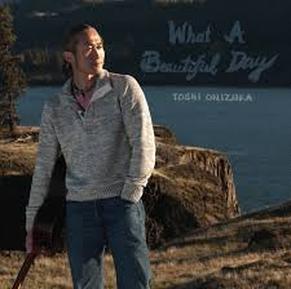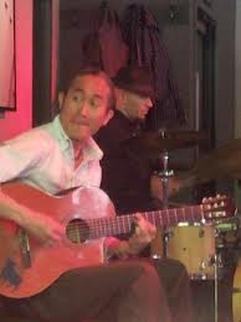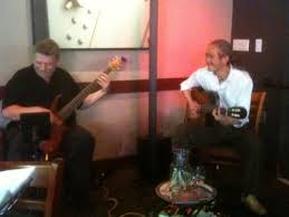
In 1993, Toshi left Japan for Seville, Spain where he would learn and practice and develop his own style and sound. He remained in Seville for over five years and absorbed the music of Spain, travelling to distant parts of Spain and even to Morocco. For two years, he performed and toured with Pata Negra, an internationally renowned Flamenco-fusion group. The captivating rhythms of his playing can be traced to these roots.
His first CD, entitled “Toshi,” was released in 1997. Toshi himself composed and produced the songs on the CD, while being joined by musicians from Spain and Brazil. In Toshi's later CDs, the sound of Brazilian samba and bossa nova are clearly heard. He had truly become a "fusion" artist.
Toshi now makes his home in Portland, Oregon. His association with Portland's great musicians has expanded his play and his opportunity to further pursue the sound in his head. He has recorded with singer Gino Vanelli and with fusion pianist Mike Prigodich. He has been featured in many Oregon Music and Arts festivals and has appeared on numerous television and radio specials.
Toshi's second solo CD, “Voy Con Fusión,” was released in September, 2008. This was a superb example of his fusion of flamenco, jazz, rock, and even hip hop. His third solo CD was entitled “When You Passed By” and was released in March of 2012. Both of these magnificent recordings featured contributions from Portland's bullpen of great musicians including drummer Reinhardt Melz, bassist Damian Erskine, percussionist Israel Annoh, vocalist Tracey Harris, bassist Jon Hughes and so many others.
Toshi defies categories. "Fusion" remains the best, most accurate, description of his play but even this is found lacking when he breaks into a traditional piece such as “Besame Mucho.” Fusion, traditional Spanish, jazz, bossa nova or rock, Toshi plays them all with sublime musicianship and heart.
This is the main character of Toshi Onizuka's musicianship; it is his warm heart that provides the rhythm to his supreme performances.
 Toshi Onizuka with drummer Reinhardt Melz
Toshi Onizuka with drummer Reinhardt Melz The first track is the title song, “What a Beautiful Day,” is performed on a custom-made Spanish Guitar crafted by Kerry Char. The song fades in with gentle background strumming to be joined by a delicate Spanish-style pick-strumming.
The imagery is unmistakable in its depiction of a sunny, warm day—more like Spain than Oregon. The clear picking casts an exquisite and impressionistic melody.
“Blue Eyes” is the second track and features Toshi playing the Ovation 1984 Limited with its clear tones. It is a melancholic romance with that splendid Ovation uniqueness for just such a mood.
The delicate finger-work that is so indicative of Toshi’s guitar-craft is in vivid color on this piece. His quick runs are virtuosic and lyrical all at the same time.
That Spanish Guitar and the Ovation are both employed and are joined by a KAMAKA 8-string ukulele on “No Answer.” The theme is as unfulfilled and as haunting as the title implies. The skip-strumming also paints a picture of unrequited approach. There is a longing and an insistence in the piece that Toshi is a master of portraying in its barest, agonizing simplicity.
The fourth track is “Una Carta de Amor” and is one of Toshi’s most lovely compositions. It plays like a song of remembrance. After all, the title means “A Love Letter.” There are charming chord changes in this captivating melody. The switch to samba at the end is a sweet segue into “Why Do We Fall in Love.” That piece also employs the KAMAKA 8-string with the 1984 Ovation and a Silvertone Vintage Acoustic Guitar.
The Andante strumming of “Why Do We Fall in Love” sets a backdrop for the conversation pace and tone of the Silvertone. The title and the piece itself ask the unanswerable question. The probing, soul-searching inquiry reaches great depth while finding no answer. Still, the question is a worthy one and the searching within the piece is an adventure worth taking.
Toshi’s albums are reflective and autobiographical in so many ways. “Unerasable Memory from My Mind” carries a heavy load of loss and the heart-break of the song is unrelenting. It is the unforgettable love that does not diminish or pass away no matter what may befall.
It is forever sweet but also it is forever sad. The sound reveals the soul as only Toshi Onizuka can unveil. This is another characteristic of Toshi’s composition and musicianship; he is a revealer and a reminder of what lies so deep within the hearer. He holds a mirror up to the self.
 Bassist Jon Hughes alongside Toshi Onizuka
Bassist Jon Hughes alongside Toshi Onizuka One of the most emotionally lavish pieces is the eighth track entitled “The Earth, the Ocean and the Sky.” It is the only piece with vocals on the album. The lyrics were written by Candace Shutter, Toshi Onizuka and Okaidja Afroso and it is Afroso who sings those lyrics.
The lyrics are mesmerizing and Afroso’s vocals are breathless and inspiring. The melody is almost a lullaby that, with those vocals, create a true song of innocence.
One of my very favorite pieces on the album is “Midnight Cruise in PDX.” A tone poem, if there ever was one, it is a flawless description of that midnight drive through Portland. The lights of the city reflecting off the waters of the Willamette River, the hum of the tires over the metal grating on Portland’s many bridges, the rhythmic thump rolling over the road joints—all captured by Toshi’s strum patterns, pickings styles and Las Palmas clapping. It is a memorable piece, indeed.
“Hawaiian Style” is played on the custom Spanish Guitar only. It is the shortest track on the album. That in itself calls to mind a picture of the oh-to-brief smile. Short but delightful.
“Light in Shade” is one of very favorites songs of all-time and is certainly my favorite Toshi piece. And that is saying a lot. There is no other song like this one. The sweet opening pauses, then surrenders to the most wonderful melody, chord changes, rhythms and memories one could ever hope to find.
“Light in Shade” is just amazing. I have never had a piece of music so easily move me. Before now, it was the YES song “Awaken” that had that claim on me. While both songs are introspective and emotional, “Light in Shade” is purely instrumental without the interpretation of lyrics. The song is precise, almost mathematical. After sitting in with Toshi’s trio for a live performance, bassist Victor Little said of it, “it is a demanding piece to play but it is also incredibly warm and emotional.”
“Light in Shade” plays it so emotionally that it is impossible to describe. During one live performance with his trio, Toshi's intro was moving and graceful and one could see his regular bassist Jon Hughes with eyes closed listening, while drummer Reinhardt Melz had his head bowed as they both let the melody and the movement flow over them.
This song is like reaching enlightenment. There is a pull to the music that carries you further and further along until labor and effort cease and you are borne aloft simply by the melody. You stop actively listening and you fall into meditation. This melody is like a stream of joy and it remains even when the music has stopped. It is a changed life that is at the heart of this piece. Every time I hear it, I am not the same as before. Joy is created and enhanced and life is reborn once again.
It is like a long gaze into a clear pool of water. On the surface is one's own reflection, but looking past that, one can see straight to the bottom with all the wonders so clear for observation. That is the light in the shade--to see what is usually obscure, especially to ourselves.
The album closes out with “Utatane (Doze).” It is played on the Spanish Guitar, the 1984 Ovation and the KAMAKA. Very much a song of repose and relaxation, “Utatane” is a poetic description of a siesta or a daydream or a nap. The song is perfect for such languid luxuries. The duo of ukulele and Ovation is like being on the cusp of wakefulness and dreaming.
Just like the whole album.
"What a Beautiful Day" and Toshi's two previous albums can be purchased here: http://www.cdbaby.com/cd/toshionizuka3
Visit Toshi's web site at: www.toshionizuka.com

 RSS Feed
RSS Feed
